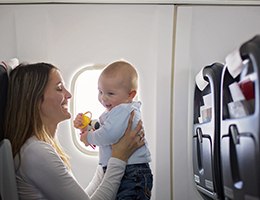
Aug. 12, 2019—Getting ready to fly on a commercial airplane takes the usual prep work, like buying your tickets and packing the appropriate clothes. But you might consider something else before you travel with a child: What if your child becomes seriously ill on the plane?
It's not uncommon for kids to have medical emergencies on airplanes. But onboard first aid kits may have limited resources for treating children, according to a new study in the journal Annals of Emergency Medicine.
Common emergencies in the air
Researchers looked at medical incidents involving children on 77 international flights. They found that almost 16% of medical emergencies on airlines involved children. The most common incidents were the type seen in hospital emergency rooms, including:
- Nausea and vomiting.
- Fever or chills.
- Allergic reactions.
- Abdominal pain.
- Stomach flu.
- Fainting.
- Seizures.
While flight crews managed most of the emergencies, 1 in 6 children needed further care after the plane landed.
Not meant for children
Under Federal Aviation Administration (FAA) rules, U.S. airlines must have first aid kits stocked with medicines—from aspirin to asthma inhalers. But most therapies in the kits aren't tailored to children, according to the research team.
For example, the medicines may be in pill form, which young children may not be able to swallow. They may need liquid medicines instead. Or the medicines might be in adult dosages.
Researchers: 'Parents should take precautions'
The FAA is currently looking into whether airline medical kits lack pediatric treatments, according to the researchers. So changes could be coming.
In the meantime, the study's authors say these tips may help adults flying with children avoid a sky-high emergency:
- Bring any medicine you think a child may need with you.
- Place the medicine in a carry-on bag rather than checked baggage. That way you'll have it within reach and you don't risk being without the medicine.
When you go through airport security, you'll need to tell the Transportation Security Administration (TSA) screeners that you're carrying medicines. And you'll need to remove them from your carry-on bag so that they can be screened.